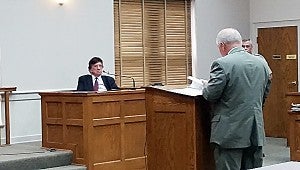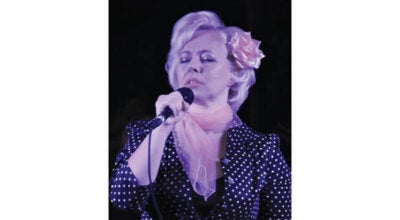Request for temporary injunction against Covered Bridge Stage denied
Published 7:31 am Friday, May 22, 2015
The show will go on at the Covered Bridge Stage.
On Thursday morning, First Judicial Chancellor John Rambo denied a request for a temporary injunction filed by Thomas and Roma Cowan in their lawsuit to have the stage dismantled and removed from the Covered Bridge Park.
The request, filed against the City of Elizabethton and City Manager Jerome Kitchens, was heard in Chancery Court Thursday morning. Cowan, a former attorney, disbarred in 2012 after pleading guilty on tax evasion charges, represented himself.
The city was represented by attorney Earl Booze, of the Johnson City law firm Herron, Booze and McPeak.
The denial for the temporary injunction will allow the Covered Bridge Celebration to continue in its traditional location using the newly constructed stage for the musical entertainment during the festival. The judgement also allows for the Covered Bridge Jams summer concert schedule to continue from mid-June until the end of August.
Cowan filed suit on May 12 and is seeking to have the new stage removed because he said it violates the city’s ordinances against disturbing the peace, its anti-noise ordinance and parking requirements.
He testified Tuesday that the stage is only 46 feet, 8 inches from his bedroom on the lot adjoining the Covered Bridge Park and that his quality of life had been diminished since the installation of the stage.
He said he had contacted city officials with his objections to the stage, and with location alternatives, but his concerns had “fallen on deaf ears.” He said he had expressed concerns over the lack of parking, the noise violations and told city officials he did not want the stage or events located in “his backyard.”
He said even after the city knew of his objections to the “pop bands and rock concerts” that would be held on the stage, the city continued with the construction of the structure. Cowan told Rambo he suggested moving the stage to Cat Island Park, Sycamore Shoals Historic Park or the new Elizabethton High School stadium.
Since the first concert was held on the stage this year on May 7, Cowan said he has suffered gastrointestinal distress, GERD and esophageal reflux. He said he has taken over-the-counter medications, such as Nexium and 300 Alka Seltzer tablets.
He added that when the concert was held at the stage he could not watch television, go outside and could not relax or rest. He also said visitors to downtown during special events frequently parked in the parking lot at his building or his yard.
Booze asked him if he had seen a doctor for his health concerns or called 911 or the police to report the unwanted vehicles. Cowan responded he had not.
Booze also questioned Cowan if he had filed complaints on any of the other events featuring music, bands or singing in downtown, such as the Christmas parade, the EHS homecoming parade or the Independence Day celebrations. Cowan said he had issued a complaint about last year’s July 4 event but not the others.
When city officials were called on to testify, Kitchens said the city did consider other locations for the stage before settling on the Covered Bridge Park. The location was selected because of its proximity to downtown Elizabethton and the presence of the bridge as a backdrop for the events.
The schedule for the stage was designed to bring visitors to downtown Elizabethton and to increase business for the downtown central business district.
Booze asked if the city had received complaints about the events, the available parking or restrooms from anyone other than Cowan, to which Kitchens responded they had not.
The city addressed the concerns with the noise ordinance, pointing out the concerts would be held from 7-9 p.m. The noise ordinance states “unreasonably loud, disturbing and unnecessary” noise caused by loudspeakers, instruments, music, singing and other sources that damages the rest, repose and relaxation of anyone in the vicinity is banned in the city, particularly from 11 p.m. to 7 a.m.
Officials said any events held would be finished by 9 p.m., and that no other residents in the area had issued any complaints about the concerts.
Booze noted that Cowan did not own the property in question; it belongs to his wife. He also noted that Cowan’s wife owned a home in Johnson City and rents a home in Knoxville.
In his judgement, Rambo said there was no proof or evidence the events planned by the city would happen any way other than described in their schedule. He said the city selected the park because the bridge was a “marquee feature “ for Elizabethton, which was known throughout the region.
Rambo pointed out The Covered Bridge Celebration had been held in downtown for 48 years and had much larger crowds than the concert series would. Up until this point, there have been no complaints about parking, Rambo said. He continued, noting the city had researched other options before settling on the Covered Bridge Park and had not acted in an “arbitrary manner.”
Rambo said one of a city’s municipal functions is to operate parks in a way that is for the public benefit. He also noted Cowan does have access to his wife’s other home in Johnson City for the times when the stage will be used, which Rambo said would only be two hours per week.
Although the request for a temporary injunction was denied, the lawsuit continues. Cowan seeks to have the stage dismantled and removed from the park and contends there are more suitable city park areas for such a stage.





